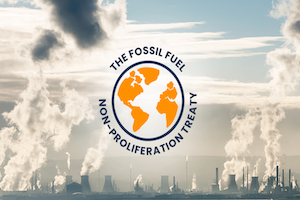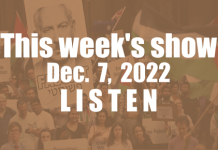
The United Nation’s COP27 International Climate Conference has come and gone in Egypt, and the parties, which include almost all the nations of the world, failed once again to call for an end to the production and burning of fossil fuels. The best the COP27 conference could do was reiterate a pledge from last year’s conference that nations would commit to “phasing down” – not “phasing out” coal.
But another process that got underway in 2020 has as its goal completely ending the use and production of coal, oil and gas. It’s called the Fossil Fuel Non-Proliferation Treaty and it was proposed by Vanuatu, a small Pacific island nation severely threatened by rising sea levels. The only other country to sign on so far is the neighboring island nation, Tuvalu.
Between The Lines’ Melinda Tuhus spoke with Osprey Orielle Lake, founder and executive director of the Women’s Earth and Climate Action Network, who also serves as a steering committee member for the Fossil Fuel Non-Proliferation Treaty. Here, she explains how the effort is building and the ways in which it could interface with the ongoing campaign to limit global heating to 1.5 degrees Celsius under the 2015 Paris climate agreement.
[Editor’s note: The audio version of this interview was shortened due to broadcast time constraints.]
OSPREY ORIELLE LAKE: The Fossil Fuel Non-Proliferation Treaty is an initiative rooted in vital efforts by the Pacific Island nations. So, it has quite an interesting history and was officially launched in its present form in 2020 by an international coalition of activists, scholars, movement leaders and indigenous leaders, so there’s a lot of different people engaged at this point.
It’s really been inspired by the Nuclear Non-Proliferation Treaty and the campaign is really designed to phase out fossil fuels and fast track climate solutions. So that’s its primary goal, and I think what’s really essential – especially as I’m coming back from COP27 in Egypt – is that we all need to remember that the Paris climate agreement is designed around carbon emission reductions, in other words, how to reduce the pollution we’ve already put into the atmosphere.
This is a process that’s very important, to be sure, but it does not address the critical aspect of the supply end, meaning actual fossil fuels. So what’s important about the treaty is that it really is a parallel or complementary treaty that needs to go along with the Paris climate accord, because it directly deals with phasing out all fossil fuels – coal, gas and oil.
It’s very exciting because it is really beginning to grow each year since 2020. There’s been a lot of endorsements by cities, by Nobel laureates, health institutions. So now we’ve had two countries call for the treaty, so momentum is building. And since that call for the treaty happened at COP27 there were at least 25 multilateral and bilateral meetings by countries around the treaty, because people became more and more interested in it. So, I think it’s really important to understand that we need another mechanism, another instrument in addition to the Paris climate agreement if we’re going to deal with the source of the climate crisis, which is fossil fuels.
We are seeing Pacific island nations calling for the treaty because they are vulnerable countries. They are countries that — because of sea level rise that comes with global warming — are greatly threatened. And it’s their very existence – their cultural existence, their existence as countries, as peoples – so it’s an urgent cry, really, for there to be a phaseout of fossil fuels, which is really the only way we are going to have the kind of emission reductions we actually need to meet what the science is telling us we need to do in time.
MELINDA TUHUS: You said, Osprey, that these two countries have called for the treaty and others are interested, but are there any others that have signed on yet, or no?
OSPREY ORIELLE LAKE: No other countries, but many, many other cities have signed on and other institutions, of course. Lots of civil society engagement. I think it’s really interesting to see there has been such a great expression of interest in the treaty itself, all over the world.
MELINDA TUHUS: So, what would the mechanism be if more countries come on board. This would be something that would be brought up to the United Nations for ratification or what?
OSPREY ORIELLE LAKE: Yes, it could be brought into a UN process in the same way we are working on the Paris climate agreement. There could be a way that countries would negotiate a treaty very much like they did the Nuclear Non-Proliferation Treaty. So we have seen these kind of treaties work in the past, which is what this treaty is based upon. And it has three key pillars: one, preventing the proliferation of coal, oil and gas by ending exploration and production, which is something we have to do immediately. We know the IPCC and the International Energy Agency have called for no new fossil fuel expansion if we are going to meet the 1.5-degree target of the Paris agreement. So that’s Number One.
Number Two, sort of a global disarmament or phasing out existing and production in line with the Paris 1.5-degree goal, reducing the stockpiles.
And the third pillar of the treaty would engage with a peaceful transition, meaning fast-tracking solutions and a just transition off of fossil fuels for every worker, community and country, because obviously economies and people’s way of life is tied into fossil fuels.
One of the things that’s really important about this treaty is that it’s really hopeful and addresses the source of the problem and gets right at it. I think that one of the shining lights for climate justice right now is the treaty.
For more information, visit Fossil Fuel Non-Proliferation Treaty at fossilfueltreaty.org.
For the best listening experience and to never miss an episode, subscribe to Between The Lines on your favorite podcast app or platform: Apple Podcasts, Spotify, Stitcher, Google Podcasts, Amazon Music, Tunein + Alexa, Castbox, Overcast, Podfriend, iHeartRadio, Castro, Pocket Casts, RSS Feed.




